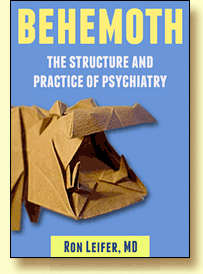Behemoth: the Structure and Practice of Psychiatry
Behemoth: the Structure and Practice of Psychiatry
Ebook Synopsis
My motive for writing this book is to alert people that psychiatric thought is illogical, deceptive and harmful. The concept of mental illness is seriously flawed. Yet it is used to justify the expenditure of millions of dollars searching for the causes of it in the brain, thus obstructing the development of other paradigms for understanding and relieving human suffering. The concept of mental illness is also used to define what is abnormal and, hence, what is normal behavior. It is a serious error to allow a flawed institution like psychiatry to define the ideals of behavior and the standards of deviance. The flawed concept of mental illness is also used to justify the labelling and drugging of significant numbers of people, including children. More serious is the use of the flawed concept of mental illness to define people and to deprive certain people of freedom by confining them to institutions called mental hospitals, a practice that makes a mockery of our claim that, as a society, we value human freedom and have the obligation to defend freedom around the world.
development of other paradigms for understanding and relieving human suffering. The concept of mental illness is also used to define what is abnormal and, hence, what is normal behavior. It is a serious error to allow a flawed institution like psychiatry to define the ideals of behavior and the standards of deviance. The flawed concept of mental illness is also used to justify the labelling and drugging of significant numbers of people, including children. More serious is the use of the flawed concept of mental illness to define people and to deprive certain people of freedom by confining them to institutions called mental hospitals, a practice that makes a mockery of our claim that, as a society, we value human freedom and have the obligation to defend freedom around the world.
I do not expect the ideas in this book to be happily accepted either by psychiatrists or by the general public. Psychiatrists will be unhappy with it and, indeed, either repress it or ignore it because it challenges their identity as medical physicians. In my view, psychiatry is more like a branch of homeland security or a kind of secular religion than it is a branch of medicine, but the claim that mental illnesses are brain diseases is a rhetorical deception that prevents us from seeing psychiatry in these ways. The general public will be unhappy with this critique of psychiatry because it relies on psychiatry to protect them against school shooters, terrorists and other dangerous or scary people. We consider ourselves to be a nation ruled by law, but law is not enough. The public demands preventive detention as well as legal detention.
The author, Ron Leifer, MD, MA, is a psychiatrist with over fifty years’ experience as a non-medical, non-coercive psychotherapist. In 2001, Ron was awarded the “Thomas Szasz Award for Outstanding Contributions to the Cause of Civil Liberties”